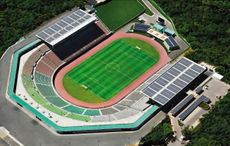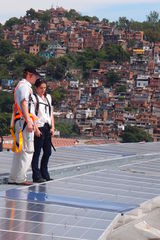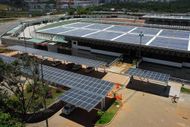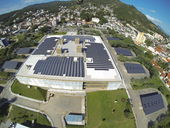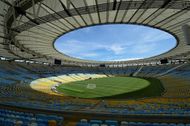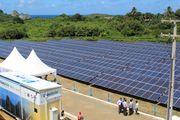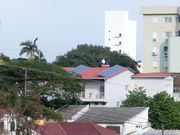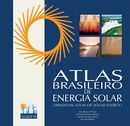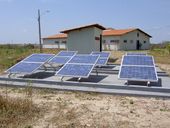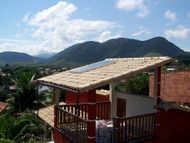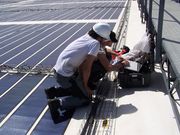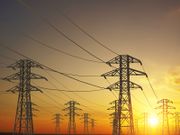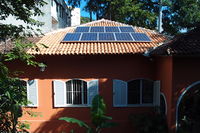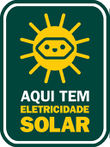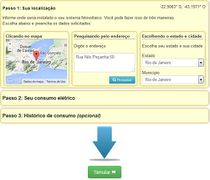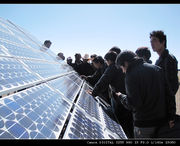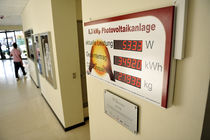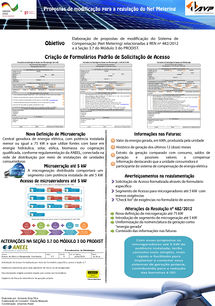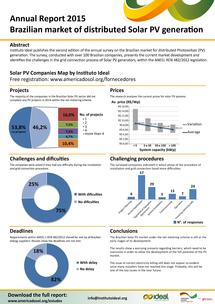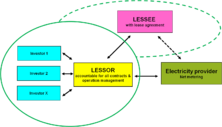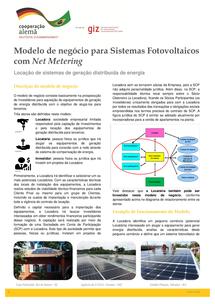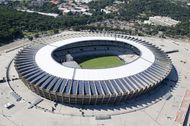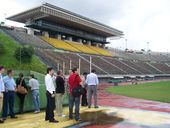Knowledge fuels change - Support energypedia!
For over 10 years, energypedia has been connecting energy experts around the world — helping them share knowledge, learn from each other, and accelerate the global energy transition.
Today, we ask for your support to keep this platform free and accessible to all.
Even a small contribution makes a big difference! If just 10–20% of our 60,000+ monthly visitors donated the equivalent of a cup of coffee — €5 — Energypedia would be fully funded for a whole year.
Is the knowledge you’ve gained through Energypedia this year worth €5 or more?
Your donation keeps the platform running, helps us create new knowledge products, and contributes directly to achieving SDG 7.
Thank you for your support, your donation, big or small, truly matters!
Difference between revisions of "Net Metering in Brazil"
***** (***** | *****) |
***** (***** | *****) m |
||
| (430 intermediate revisions by 10 users not shown) | |||
| Line 1: | Line 1: | ||
| − | = Introduction = | + | = Introduction<br/> = |
| − | Currently, solar energy plays just a marginal role in Brazil’s energy supply. The almost endless solar resources | + | Currently, solar energy plays just a marginal role in Brazil’s energy supply. The almost endless solar resources have no market for small scale solar systems. However, the new Net Metering regulation 482/2012, introduced by the Brazilian electricity sector regulatory body (Agência Nacional de Energia Elétrica, ANEEL), has finally opened the doors to tap a vast potential for decentralized small scale electricity generation up to 1 MW. It is a big step for Brazil´s renewable energy sector and great opportunities for German technologies in the Brazilian market. [http://www.giz.de/de/html/index.html Deutsche Gesellschaft für Internationale Zusammenarbeit (GIZ) GmbH]<ref name="GIZ"> As a federal enterprise, the Deutsche Gesellschaft für Internationale Zusammenarbeit (GIZ) GmbH supports the federal German government in achieving its international cooperation objectives. Together, Brazil and Germany face global challenges such as preserving biodiversity and fighting climate change. The German Cooperation for Sustainable Development therefore operates primarily in two areas: Protection and sustainable management of Rain Forests as well as Renewable Energies and Energy Efficiency. Within the cooperation with the Brazilian partners GIZ provides advice on strategy development, support for developing management and cooperation structures, as well as technical expertise. </ref> supported ANEEL to develop and implement the Net Metering regulation. Further to this, the [http://institutoideal.org/ IDEAL Institute](Instituto para o Desenvolvimento de energias alternativas na América Latina)<ref name="IDEAL">Ideal Institute, created in 2007, is a private nonprofit based in Florianopolis, State of Santa Catarina, Brazil. Ideal Institute is an institution that promotes renewable energy and the development of policies for energy integration in Latin America. Ideal conducts three major areas of expertise: the Eco_Lógicas Contest, the Cleaner Energy Seminar, and América do Sol. They all include a number of initiatives free of charge.</ref> and the <span style="line-height: 20.4px; font-size: 13.6px; background-color: rgb(255, 255, 255)">Brazilian Association for Solar Photovoltaica Energy (</span>[http://www.absolar.org.br/ ABSOLAR - Associação Brasileira de Energia Solar Fotovoltaica]<span style="line-height: 20.4px; font-size: 13.6px; background-color: rgb(255, 255, 255)"><ref name="ABSOLAR">Founded in 2013,ABSOLAR - Associação Brasileira de Energia Solar Fotovoltaica(Brazilian Association for Solar Photovoltaica Energy) the Brazilian Association of Solar Energy Photovoltaic (ABSOLAR) is a legal entity of private non-profit organization that brings together companies from the entire production chain of the photovoltaic industry (PV) with operations in Brazil. The ABSOLAR coordinates, represents and defends the interests of its members in the development of the sector and the solar PV market in Brazil, promoting and disseminating the use of solar PV in the country.</ref>) are </span>promoting and disseminating the use of solar PV in Brazil.<br/> |
| − | |||
| − | |||
<br/> | <br/> | ||
| Line 10: | Line 8: | ||
=== Articles<br/> === | === Articles<br/> === | ||
| − | [ | + | [[:File:From the first solar-powered stadium in Latin America to PV Business for everybody.pdf|From the first solar-powered stadium in Latin America to PV Business for everybody (2013)]] [[File:Pituacu Solar Stadium.jpg|border|right|230px|Pituacu Solar Stadium - Salvador da Bahia|alt=Pituacu Solar Stadium - Salvador da Bahia]]<br/>[[:File:Vom ersten Solarstadion zum brasilianischen Net Metering.pdf|Vom ersten Solarstadion Lateinamerikas zum brasilianischen Net Metering (2013)]]<br/>In 2012, the first Brazilian photovoltaics pilot project, the solar-powered stadium Pituaçu in Bahia state was inaugurated. It was <span style="line-height: 20.4px; font-size: 13.6px; background-color: rgb(255, 255, 255)">implemented by the local energy provider COELBA and supported by GIZ. </span>This successful venture established further progress to increase the share of photovoltaic-generated electricity in the Brazilian energy system. Consequently, ANEEL introduced a Net Metering system within a new regulation for decentralized small scale electricity generators up to 1 MW.<br/><br/>[[File:Rooftop of Solar Stadium Maracanã - Rio de Janeiro.jpg|border|left|160px|Rooftop of Solar Stadium Maracanã - Rio de Janeiro|alt=Rooftop of Solar Stadium Maracanã - Rio de Janeiro]][[:File:PV businesses up to 1 MW under Brazils new Net Metering rules.pdf|PV businesses up to 1 MW under Brazils new Net Metering rules (2013)]]<br/>[[:File:Net Metering in Brasilien - Wirtschaflichkeit PV für Haushalte und Gewerbe.pdf|Net Metering in Brasilien - Wirtschaflichkeit PV für Haushalte und Gewerbe (2013)]]<br/>This paper assesses the profitability of decentralised electricity generation within the Brazilian housing and commercial sectors using the example of photovoltaics in the context of the introduction of the Net Metering system. The analysis is limited to the low-voltage level, since it has by far the highest retail tariffs. |
| + | |||
| + | <br/> | ||
| + | |||
| + | Net Metering in Brazil - Results after one year [[:File:Net Metering in Brasilien - Bilanz nach einem Jahr.pdf|- Net Metering in Brasilien - Bilanz nach einem Jahr (2014)]]<br/>The article gives a review of the progress of the Brazilian Net Metering system after approximately one year since its introduction (12/2012). Trends and challenges to new grid connections as well as funding and incentivizing measures are important issues referring to this.<br/> | ||
<br/> | <br/> | ||
| − | [[:File: | + | „Tariff realism“ as an impulse for PV in Brazil - [[:File:Tarifrealismus als Impuls für die Photovoltaik in Brasilien.pdf|„Tarifrealismus“ als Impuls für die Photovoltaik in Brasilien (2015)]]<br/> |
| + | |||
| + | Electricity Tariffs began to increase since the beginning of 2015 and the government announced the return to „tariff realism“, which aims at the alignment of the end consumer tariffs with the electricity production cost. This could significantly encourage decentralized PV production, as it turns small PV generation using Net Metering more profitable. | ||
| − | + | <br/> | |
| − | + | === Fact- & Infosheets<br/> === | |
| − | In | + | [[File:PV Rooftops Parking Lot Solar Stadium Pituaçu.jpg|border|right|190px|Parking Lots Solar Stadium Pituaçu|alt=Parking Lots Solar Stadium Pituaçu]] Pituaçu Solar - The first solar stadium in Brazil [[:File:Infoblatt Pituaçu.pdf|- Pituaçu Solar - Das erste Solarstadion Brasiliens (2012)]]<br/>In the course of football world cup 2014, the idea to utilise public´s attention in Brazil to introduce catchpenny photovoltaic projects through football was born. Shortly after, the Brazilian energy supplier COELBA supported by GIZ introduced a pilot project to build the first Brazilian solar stadium Pituaçu, with a capacity of 400 kWp. Financed by <span dir="auto">the </span>[[Energy Efficiency Program (PEE) in Brazil|Brazilian Energy Efficiency Program (PEE)]], the German-Brazilian EPC ''Gehrlicher Ecoluz Solar'' realized the installation of the system. This project led to investments of 2 Mil. Euro from the Brazilian private sector, applying 60.000 Euro of German public tax resources for the project.<br/><br/>Unbureaucratic Net Metering for decentralized electricity generation in Brazil [[:File:Infoblatt Unbürokratisches Net Metering.pdf|- Unbürokratisches Net Metering für dezentrale Stromerzeugung in Brasilien (2013)]]<br/>Reduce administrative barriers to make grid connection of decentralized renewable energy generators viable – that was one aim of ANEEL and GIZ within the German Cooperation for Sustainable Development to achieve sustainable energy use in Brazil. Within this fruitful partnership, ANEEL used its regulatory competence to reduce bureaucratization of grid connection, enabling small electricity producers by resolution 482/2012. GIZ advised ANEEL on technical and administrative aspects of the introduction of a Net Metering system and organized trainings and technical visits. |
<br/> | <br/> | ||
| + | <p style="text-align: right">[[File:Megawatt Solar.jpg|border|left|170px|PV installations on Eletrobras Eletrosul's headquarters - Florianópolis (Brazil)|alt=PV installations on Eletrobras Eletrosul's headquarters - Florianópolis (Brazil)]]Solar pilot project Megawatt Solar [[:File:Solarprojekt Brasilien Megawatt Eletrosul.pdf|- Solarpilotprojekt Megawatt Solar (2014)]]<br/></p> | ||
| + | In May 2014, another solar energy pilot project supported by the GIZ entered in operation: the 1 MWp photovoltaic system on the rooftop of the energy provider Eletrobras Eletrosul’s head office in Florianópolis. The project’s aim is to raise public awareness for Net Metering and Photovoltaics and to train relevant local actors in the field of decentralized power generation. GIZ thus offered technical expertise on the installation of the system as well as marketing of the produced electricity. An effective measure therefore was the commercialization of the electricity through the Solar Label, an initiative introduced by IDEAL Institute.<br/> | ||
| + | |||
| + | <br/>Strategic PV research and development project in Brazil - [[:File:Infoblatt Photovoltaik-Förderprogramm.pdf|Strategisches Forschungs- und Entwicklungsprojekt Photovoltaik in Brasilien (2014)]]<br/>[[:File:Infosheet Projeto Estratégico P&D.pdf|Primeiro programa de incentivo à energia fotovoltaica (2014)]]<br/>To amplify and diversify the application of financial resources of the ANEEL’s Research & Development Program for renewable energy projects, ANEEL created the Strategical R&D Photovoltaic Project. Since 2011,GIZ support ANEEL in developing a tender that encouraged energy companies to apply their R&D resources on commercial solar generation plants up to 3 MWp. Thus this measure could significantly improve spending on research and development of renewable energies in Brazil. 18 Photovoltaic projects has since been approved by ANEEL, some of them, for example the world cup solar stadiums Recife, are already realized involving huge private investment. Through the Strategical R&D Photovoltaic Project, 165.000 Euro of German spending led to 100 Mio. Euro Brazilian investment.<br/><br/>Maracanã Solar - Solar electricity for the football world cup 2014 [[:File:Infoblatt Maracanã.pdf|- Maracanã Solar - Solarstrom für die WM 2014 (2014)]] <br/> | ||
| − | [[ | + | [[File:Football stadium Maracanã - Rio de Janeiro (Brazil).jpg|border|right|190px|Football stadium Maracanã - Rio de Janeiro (Brazil)|alt=Football stadium Maracanã - Rio de Janeiro (Brazil)]]The worldwide famous Maracanã-Stadium in Rio de Janeiro was equipped with solar panels within the efforts of linking the football world cup 2014 to the promotion of solar energy. Therefore, the GIZ supported LightESCO, an Energy Service Company owned by local energy provider Light, during the conception of a PV power plant on the rooftop of Maracanã. With 390 kWp, it is the most powerful PV system in Rio de Janeiro state, and a main driver to leverage Net Metering in Brazil. The success of this project motivated Light to kickstart further PV projects in the region, also with German private sector engagement.<br/><br/>[[File:Solar Energy Plant Fernando de Noronha I.jpg|border|left|180px|Solar Energy Plant Fernando de Noronha I - Brazil|alt=Solar Energy Plant Fernando de Noronha I - Brazil]]Solar Energy for Fernando de Noronha island - [[:File:Infoblatt FV Fernando de Noronha I+II.pdf|Solarenergie für das Naturparadies Fernando de Noronha]] |
| − | [[:File: | + | [[:File:Infosheet - Energia Solar para Fernando de Noronha.pdf|Energia Solar para Fernando de Noronha (2015)]]<br/> |
| − | + | The Brazilian island Fernando de Noronha is a nature paradise and conservancy unit – good reasons to seek for clean energy solutions in order to substitute the presently prevalent thermo-electric power generation with biodiesel generators. GIZ therefore supported the first PV pilot project on Fernando de Noronha, incentivized by <span dir="auto">the [[Energy Efficiency Program (PEE) in Brazil|Brazilian Energy Efficiency Program (PEE)]]</span> and executed by the energy provider CELPE with an investment sum of five Mio. BRL (approx. 1.7 Mio. EUR). The PV power plant Fernando de Noronha I, which has an installed capacity of 400 kWp, can already cover four percent of the islands´ electricity demand; its successful implementation led to the construction of a second PV power plant on the sunny island. Fernando de Noronha II, with a capacity of 550 kWp was inaugurated in July 2015. | |
<br/> | <br/> | ||
| − | [[ | + | [[File:PV rooftop installation funded by Fundo Solar in Rio Grande do Sul-state (Brazil).jpg|border|right|180px|PV rooftop installation funded by Fundo Solar in Rio Grande do Sul-state (Brazil)|alt=PV rooftop installation funded by Fundo Solar in Rio Grande do Sul-state (Brazil)]]Solar Fund Fundo Solar – Giving impulse to the improvement of the Brazilian Net Metering - [[:File:Infoblatt Fundo Solar.pdf|Solar Fonds Fundo Solar – Impulsgeber für die Verbesserung des brasilianischen Net Metering (2015)]] |
| + | |||
| + | The Solar Fund was created by the NGO Ideal Institute, GIZ and Grüner Strom Label e.V. (Green Electricity Label - GSL), a German association that promotes the use of green energy in Germany. The aim of the Solar Fund is to support the dissemination of Net Metering and distributed generation in Brazil by s giving financial and technical support for end users. The Solar Fund identified barriers for the installation of a residential PV system which are used to improve the Net Metering regulation. | ||
| + | <div><br/></div><div><br/>[[Net Metering in Brazil#toc|►Go to Top]]<br/></div> | ||
| + | = Net Metering<br/> = | ||
| − | + | == Preparation == | |
| − | <br/> | + | [[:File:Brazilian Atlas of Solar Energy.pdf|Brazilian Atlas of Solar Energy (2006)]] [[File:Front Page Solar Atlas.jpg|border|left|130px|Front Page Solar Atlas.jpg|alt=Front Page Solar Atlas.jpg]]<br/>The Brazilian Solar Energy Atlas includes maps and digital data of various solar radiation components as well as detailed infrastructure and socio-economic parameters. The resulting database is compatible with the Geographical Information Systems (GIS) and therefore may be easily employed in feasibility studies during renewable energy project development. After analysing the temporal and spatial variations and trends of solar energy resources, the atlas presents some solar energy scenarios for Brazil.<br/> |
| − | = | + | <br/>[[:File:Electricity Market in Brazil focusing on Distributed Generation.pdf|Survey of the Electricity Market in Brazil focusing on Distributed Generation (2011)]]<br/>[[:File:Mercado de energia elétrica no Brasil focando na Geração Distribuída.pdf|Estudo sobre o Mercado de Energia Elétrica no Brasil focando na Geração Distribuída (2011)]]<br/>In Brazil, electricity must be traded in one of two environments of the market, the Regulated Contracting Environment – ACR and the Free Contracting Environment – ACL. This report describes the main characteristics of the two market environments, with the purpose of assessing the possibility of implementing distributed power generation in Brazil through photovoltaic projects. It also indicates the states that are already offering tariff parity. Another conclusion is that in the Brazilian scenario, the metering system in the net-metering mode is more feasible than the feed-in tariff model.<br/><br/>[[File:Small Scale Solar Energy Plant.jpg|border|left|170px|Small scale solar power plant|alt=Small scale solar power plant]] [[:File:Challenges and Opportunities of the integration of new consumers and decentralized power plants.pdf|Challenges and Opportunities of the integration of new consumers and decentralized power plants (2009)]]<br/>The main objective of this study is to inform about the current regulations, standards, as well as control and measurement methods of reactive power and power factor applied in Europe. Furthermore, it describes interrelated challenges of and opportunities for the integration of new consumer groups and decentralized renewable energy based power generation. |
| − | |||
| − | |||
| − | |||
| − | |||
| − | |||
| − | |||
| − | |||
<br/> | <br/> | ||
| − | = Net Metering = | + | [[File:PV installation on residential rooftop - Cachoeiras de Macacu (Brazil).jpg|border|right|190px|PV installation on residential rooftop - Cachoeiras de Macacu (Brazil).jpg|alt=PV installation on residential rooftop - Cachoeiras de Macacu (Brazil).jpg]] [[:File:Implementation of small grid connected decentralized power generators in Brazil(2010).pdf|Implementation of small grid connected decentralized power generators in Brazil (2010)]]<br/>[[:File:Implementação de geradores de energia descentralizados no Brasil ligados a uma pequena rede.pdf|Implementação de geradores de energia descentralizados no Brasil ligados a uma pequena rede (2010)]]<br/>This article gives an overview on the renewable energy support policies - Feed-in tariffs and Net Metering - analyzing their legal framework in Germany. It subsequently develops perspectives for Net Metering in Brazil. Further attention is paid on the impact of decentralized generation on load curves and distribution infrastructure.<br/> |
| + | |||
| + | <br/>[[:File:International Procedures for the Connection of Small Distributed Generators to the Power Grid.pdf|International Procedures for the Connection of Small Distributed Generators to the Power Grid (2011)]]<br/>To help ANEEL developing the legal procedures for decentralized distributed generation, this study addresses the legislation in Germany and Italy as reference countries with sharp increase of decentralized power generation plants up to 1 MW, in particular from renewable energies, in the recent years. It gives an overview of the relevant energy law provisions and, in this context, existing contracts between energy operators and grid operators for the interconnection of small distributed power generation plants.<br/><br/>[[File:Installation of PV system Solar Stadium Pituaçu.JPG|border|left|180px|Installation of PV system Solar Stadium Pituaçu - Salvador da Bahia (Brazil)|alt=Installation of PV system Solar Stadium Pituaçu - Salvador da Bahia (Brazil)]] [[:File:International Standards for the Connection of Small Distributed Generators to the Power Grid.pdf|Standards for the Connection of Small Distributed Generators to the Power Grid (2011)]]<br/>Legal-administrative barriers for the connection of small distributed generators led in the past to negative impacts on the implementation of decentralized generation in terms of longer project durations, higher costs, longer waiting times and more demanding labor requirements. The comparison and assessment of different international technical standards for interconnecting of small distributed generation units to the public grid in the European countries (Germany, Italy and Spain) and the United States of America, thus, allows to derive recommendations for a simplified connection procedure in coherence with Net Metering in Brazil.<br/><br/>[[:File:Regulatory Framework for the Interconnection of the Costumer in Brazil - Generators and its Barriers.pdf|Regulatory Framework for the Interconnection of Costumer-Generators and its Barriers (2011)]]<br/>The former status quo of the proceedings in costumer-generation projects before the introduction of Net Metering in Brazil did not allow the injection of electricity from distributed generation in the grid. Hence, the missing regulatory incorporation of distributed generation respective costumer generation is the fundamental barrier for its diffusion. To achieve the simplification of the connection procedure for costumer-generation, interconnection barriers resulting from regulatory obstacles in Brazil are identified as well as an overview to the development of PV in Brazil and the regulatory framework, rules and proceedings for interconnection of distributed generation is given.The aim is to enable interconnect despite the interconnection barriers and develop attempts on the introduction of incentive schemes within the legal framework.<br/> | ||
| − | = | + | <br/>[[File:Power Transmission Line.jpg|border|left|180px|Power Transmission Line.jpg|alt=Power Transmission Line.jpg]] [[:File:Consequences on Grid Operation by Decentralized Renewable Power Generators.pdf|Consequences on Grid Operation by Decentralized Renewable Power Generators (2011)]]<br/> |
| − | [[:File: | + | In Germany, lately some developments with respect to renewable power generation and its connection to the different voltage levels occurred. Due to the enormous increase of such installations and the fact that renewable power generation units so far have been considered more or less as “negative loads”, but without consideration of their capabilities to act in the same way as conventional power plants, certain problems arose. This report identifies these problems and discusses the policy measures to address them.<span id="cke_bm_237e" style="display: none" data-cke-bookmark="1"></span><br/><br/>Survey about electricity prices of consumers in the commerce and small industry[[:File:Pesquisa relacionada aos consumidores B3 no Brasil.pdf|- Pesquisa relacionada aos consumidores B3 no Brasil (2012)]]<br/>To get to know the behaviour of consumer groups is important for the process of tariff revision or the calculation of marginal costs calculation and the basis tariff related to distributed generation. Therefore, it is important to understand the methodology used to calculate the yearly average electricity consumption of the Brazilian consumer group B3 (commercial and small industry). |
| − | + | <br/>[[File:Solar Panels on Residential Rooftop.jpg|border|right|200px|Solar Panels on Residential Rooftop|alt=Solar Panels on Residential Rooftop]] Mapping methodology to determine the potential area of residential rooftops for PV in Brasil [[:File:Metodologia de mapeamento da área potencial de telhados residenciais para PV no Brasil.pdf|- Metodologia de mapeamento da área potencial de telhados residenciais para PV no Brasil (2012)]]<br/>To amplify the use of small scale energy generators, this study develops a methodology to estimate and map the potential of residential housing rooftops for electricity and heat generation produced by photovoltaic panels and solar collectors. The methodology regards aspects of the country-specific sun irradiation, total rooftop area and areas improper for use.<br/><br/>[[File:BRA116 KOPP 092096.jpg|border|left|170px|BRA116 KOPP 092096.jpg|alt=BRA116 KOPP 092096.jpg]] Manual for capacity building with the software GIS: Information Systems[[:File:Sistemas de Informação Geográfica e Aplicações no Mapeamento Solar no Brasil.pdf|- Manual de Capacitação GIS: Sistemas de Informação]]<br/>Geography and application of solar mapping in Brazil[[:File:Sistemas de Informação Geográfica e Aplicações no Mapeamento Solar no Brasil.pdf|- Geográfica e Aplicações no Mapeamento Solar no Brasil (2012)]]<br/>This training manual shows how to use the geographical information system GIS in order to map the potential of residential rooftops for electricity and heat generation. It gives instructions over the general use of GIS and the mapping software ArcGIS. Subsequently, the manual describes the use of ArcGIS to identify sun irradiation potentials.<br/><br/>[http://www.aneel.gov.br/arquivos/PDF/PeD_2011-ChamadaPE13-2011.pdf ANEEL Chamada 013 - Arranjos técnicos e comerciais para inseração da geração solar fotovoltaica na matriz energética brasileira]<br/><br/>[[Net Metering in Brazil#toc|►Go to Top]] | |
<br/> | <br/> | ||
| − | + | == Dissemination / Spreading<br/> == | |
| + | |||
| + | === Resolutions<br/> === | ||
| + | |||
| + | The resolution 482/2012 adopted by ANEEL is the regulatory base for Net Metering for distributed generation in Brazil. | ||
| − | [[:File: | + | *[http://www.aneel.gov.br/cedoc/bren2012482.pdf Resolução ANEEL Net Metering 482/2012] |
| + | *Resolution 482/2012 from ANEEL - German version [[:File:Regulierung Net Metering Nr. 482 der Nationalen Energieagentur ANEEL in Brasilien.pdf|- Regulierung Net Metering Nr. 482 der Nationalen Energieagentur ANEEL in Brasilien (2013)]]<br/> | ||
| + | *Rules of procedures for power supply in the national power grid PRODIST from ANEEL - German version [[:File:Verfahrensregeln zur Stromversorgung im nationalen Stromnetz PRODIST Brasilien.pdf|- Verfahrensregeln zur Stromversorgung im nationalen Stromnetz PRODIST (2013)]] | ||
| + | *<span style="line-height: 20.4px; font-size: 13.6px; background-color: rgb(255, 255, 255)">[http://www.aneel.gov.br/aplicacoes/audiencia/dspListaResultado.cfm?attAnoAud=2011&attIdeAud=588&attAnoFasAud=2011&id_area=13 Results of public hearings for regulation 482/2012]</span><br/> | ||
| + | *[http://www.aneel.gov.br/aplicacoes/audiencia/dspListaContribuicao.cfm?attAnoAud=2015&attIdeFasAud=971&attAnoFasAud=2015&id_area=13 All contributions to public hearings for regulation 482/2012] | ||
| − | + | <br/> | |
<br/> | <br/> | ||
| − | [[: | + | === Dissemination projects IDEAL Institute<br/> === |
| + | |||
| + | <u>[http://www.americadosol.org/ America do Sol Project]</u><br/>GIZ supports the IDEAL Institute to promote and disseminate renewable energy use. Important progress could be achieved through the project America do Sol, which offers information, educational material and online tools on solar energy, photovoltaics and Net Metering. | ||
| + | |||
| + | [[File:Educational Manual.jpg|border|left|100px|Educational Manual.jpg|alt=Educational Manual.jpg]]<br/>Educational maual "How can I have solar electricity in my home?" [http://www.americadosol.org/guiaFV/ - Cartilha "Como faço para ter electricidade solar na minha casa?" (2012)]<br/>This Manual explains in a simplified and illustrated manner all steps to connect a mini or micro generator. It shows how to calculate the financial benefits of distributed solar generation to its user and describes how to request grid connecting at the distribution company.<br/><br/>[[File:Solar Electricity Educational Manual.jpg|border|right|120px|Solar Electricity Educational Manual.jpg|alt=Solar Electricity Educational Manual.jpg]] Educational manual solar electricity [http://www.americadosol.org/cartilha-sobre-eletricidade-solar/ - Cartilha Eletricidade Solar]<br/>The Ideal Institute officially launched an educational manual on Solar Electricity. It aims to inform institutions, schools, media, business and public utility suppliers on the use of small decentralized photovoltaic systems. The manual can be sent to the institutions and can be reprinted and distributed by the institutions themselves to their customers.<br/><br/>[[File:Fundo solar.jpg|border|left|170px|Solar Fund|alt=Solar Fund]] <u>[http://www.americadosol.org/fundosolar/ Solar Fund (Fundo Solar)]</u> | ||
| − | + | This Partnership of the Ideal Institute with the Grüner Strom Label fosters distributed power micro-generation in Brazil through financial support available to home consumers and small businesses for the installation of photovoltaic generators with a capacity of up to 5 kW.<br/> | |
<br/> | <br/> | ||
| − | [[:File: | + | Presentation Solar Fund in Brazil – [[:File:Solarfonds in Brasilien (iEPW).pdf|Solarfonds in Brasilien (2015)]] |
| + | |||
| + | This presentation gives an overview to the approach, activities and first results of the solar fund in Brazil. Further to that, it explains how the fund model of the Green Electricity Label (Grüner Strom Label e.V.) works. | ||
| − | [[:File: | + | <br/><u>[http://www.selosolar.com.br/en Solar Label (Selo Solar)]</u>[[File:Selo Solar.jpg|border|right|110px|Selo Solar.jpg|alt=Selo Solar.jpg|link=http://www.selosolar.com.br/]]<br/>The Solar Label is awarded to companies or public and private institutions that consume a minimum annual value of solar electricity, which varies according to the total amount of energy consumed.<br/><br/>Preparation of the regulation for Solar Label - [[:File:Elaboração do Regulamento do Selo Solar.pdf|Elaboração do Regulamento do Selo Solar (2011)]]<br/>This report registers the process of establishment of the Selo Solar as instrument for providing the use of solar electricity. It describes the conception and implementation as well as regularization of Selo Solar and points out some challenges in its application.<br/><br/>Qualitative evaluation of the Solar Label[[:File:Avaliação qualitativa do Selo de Energia Solar Fotovoltaica.pdf|- Avaliação qualitativa do Selo de Energia Solar Fotovoltaica (2011)]]<br/>This market study aims to gain insights about the assessment of Selo Solar by the addressed target group. The intention is to gain knowledge about the receptivity of the relating electricity consumers. Therefore, the study uses a qualitative research approach. |
| − | + | Manual for the utilization of the Solar Label [[:File:Manual de Uso de Selo Solar Brasil.pdf|- Manual de Uso de Selo Solar (2011)]]<br/>Support to the elaboration of rules for the campaign of the Solar Label [[:File:Apoio na elaboração das regras da Campanha Selo Solar.pdf|- Apoio na elaboração das regras da Campanha Selo Solar (2011)]]<br/><br/>[[File:Solar Simulator.jpg|border|right|210px|Solar Simulator.jpg|alt=Solar Simulator.jpg|link=http://www.americadosol.org/simulador/]] [http://www.americadosol.org/simulador/ Solar Simulator (Simulador Solar)]<br/>The Solar Simulator is an online tool that allows to calculate the power of a photovoltaic system (solar electricity generator) required to meet the annual power demand of a residential house, a commercial or industrial building within the brazilian Net Metering. The tool calculates how much electricity the property would save as well as the total area required on the rooftop or ground area to install the solar panels.<br/><br/>Map of solar energy companies - [http://www.americadosol.org/fornecedores/ Mapa de Empresas de Energia Solar]<br/><br/><br/>[[File:Capa Microgeradores Eólicos.jpg|border|left|130px|Capa Microgeradores Eólicos.jpg|alt=Capa Microgeradores Eólicos.jpg]]Educational manual "How can I have wind energy in my home?[http://institutoideal.org/guiaeolica/ " - Cartilha "Como faço para ter energia eólica em minha casa?" (2014)]<br/>Step by step to your own wind power system – that’s what the educational manual launched by IDEAL Institute describes. It gives an overview on basic technical aspects, project planning and implementation and profitability of small scale wind power systems, including the utilization of financial compensation through Net Metering. The objective is to encourage consumers to install small scale wind power systems. | |
<br/> | <br/> | ||
| − | [[:File: | + | Presentation: Promotion of renewable energies in Brazil –[[:File:Promoção das Energias Renováveis no Brasil.pdf|Promoção das Energias Renováveis no Brasil (2015)]] |
| − | + | This presentation gives an overview to the activities of the IDEAL Institute, including projects, studies and communication materials offered by IDEAL Institute. | |
<br/> | <br/> | ||
| − | [[ | + | [http://www.americadosol.org/en/50telhados/ 50 Roof Project (2015)] [[File:Logo 50 Telhados.jpg|border|right|150px|Logo 50 rooftops project|alt=Logo 50 rooftops project]] |
| + | <div><div> | ||
| + | The Rooftops Project 50 was launched in order to promote distributed generation based on photovoltaic power. Coordinated by Ideal Institute, the project is run locally by installation companies that, by December 2015, should achieve the goal of installing 50 photovoltaic roofs of 2 kWp (or 100 kWp total installed power). | ||
| − | + | [http://app.americadosol.org/50telhados/ Map with ranking of participating cities] | |
<br/> | <br/> | ||
| − | + | Federal University of Santa Catarina-state inaugurates center for research and training in solar energy - [http://institutoideal.org/ufsc-inaugura-centro-de-pesquisa-e-capacitacao-em-energia-solar-em-florianopolis/ UFSC inaugura Centro de Pesquisa e Capacitação em Energia Solar (2015)] | |
| − | The | + | The center for research and training in solar energy of the UFSC was inaugurated in July 2015. It disposes about different PV technologies, administration, classrooms, laboratories and workshops; it also includes a small PV system with an installed capacity of 100 kWp on its rooftop. The initiative addresses the huge demand on capacity building measures in the Brazilian PV sector. |
| + | <span style="color: rgb(98, 90, 76); line-height: 21px; font-family: nunito, sans-serif; font-size: 14px; background-color: rgb(235, 230, 226)"></span><br/>[[Net Metering in Brazil#toc|►Go to Top]] | ||
| + | </div></div> | ||
<br/> | <br/> | ||
| − | + | <br/> | |
| − | + | === Other dissemination projects === | |
<br/> | <br/> | ||
| − | [[:File: | + | == Post regulation (Challenges)<br/> == |
| + | |||
| + | Analysis and inquiry about the Brazilian tariff composition[[:File:Análise e levantamento da composição tarifária brasileira.pdf|- Análise e levantamento da composição tarifária brasileira (2013)]]<br/>Uncertainty about the cost-effectiveness of a small scale photovoltaic installations in Brazil is one mayor reason for the hesitant interest in distributed generation. This uncertainty is related to an unknown composition of Brazilian electricity tariffs. The study analyses the Brazilian tariff system of the electricity sector in the low voltage consumers segment, specifically consumer groups B1 (residential) and B3 (commercial and small industry). The analysis aims to build a basis for rentability studies of PV installations. | ||
| + | |||
| + | <br/>[[File:Junge Chinesen betrachten Solarzellen.JPG|border|right|180px|Junge Chinesen betrachten Solarzellen.JPG|alt=Junge Chinesen betrachten Solarzellen.JPG]] [[:File:Importbestimmungen Net Metering Brasilien.pdf|Importbestimmungen und -Kosten für Photovoltaik-Anlagen zur dezentralen Stromerzeugung in Brasilien (2014)]] | ||
| + | |||
| + | [[:File:Condições de Importação no Net Metering do Brasil.pdf|Condições de Importação de Equipamentos de Mini e Microgeração Distribuida Fotovoltaicos (2012)]]<br/>The allocation of information about taxing for the import and export of components for small scale photovoltaic generation is crucial for the sucess of distributed genertation in Brazil. An overview on tax conditions, therefore, facilitates the entrance of foreign technology producers in the Brazilian market. Important information considering PV business consists of fiscal benefits granted by states and other public initiatives and costs for logistics and certification of components.<br/><br/> | ||
| + | |||
| + | [[File:COR102 KOPP 098134.jpg|border|left|210px|COR102 KOPP 098134.jpg|alt=COR102 KOPP 098134.jpg]] | ||
| + | |||
| + | Profitability analysis for decentralized power generation through PV in Brazil[[:File:Dezentrale Stromerzeugung durch Photovoltaik in Brasilien - Eine Wirtschaftlichkeitsanalyse (2013).pdf|- Dezentrale Stromerzeugung durch Photovoltaik in Brasilien - Eine Wirtschaftlichkeitsanalyse (2013)]]<br/>This thesis assesses the profitability of decentralised electricity generation in the Brazilian commercial sector. It aims to prove if net parity is achieved in relation to the introduction of Net Metering. Therefore, it analyses the electricity supply situation in the commercial sector, the characteristics and macro-economic influence factors of PV in Brazil. Subsequently, the author develops scenarios in which this work concludes whether profitability is given or not. | ||
| + | |||
| + | <br/>Analysis about the installation of the Readily Accessible Disconnection Device in small PV systems - [[:File:Instalação do Dispositivo de Seccionamento Visível (DSV) no Net Metering.pdf|Análise sobre a instalação do Dispositivo de Seccionamento Visível (DSV) na microgeração (2014)]]<br/>The obligatory installation of the readily accessible disconnection device (port.''Dispositivo de Seccionamento Visível - DSV)'', a component that visibly guarantees the disconnection of small generation centrals during distribution system maintenance of the provider, is one of the elements required by the PRODIST (''port. Procedimentos de Distribuição de Energia Elétrica no Sistema Elétrico Nacional) ''Module of Resolution 482. This component is not used any longer by countries with a large percentage of photovoltaics like Germany and Italy. The study analyses if the legal requirement of DSV in Brazil is a barrier on the development of small PV generation. | ||
| + | |||
| + | Adjustment of the DSV regulation from ANEEL[http://www.aneel.gov.br/arquivos/PDF/Retificação_1_da_Revisão_3.pdf - Retrificação da Regulação DSV ANEEL (2014)] | ||
| + | |||
| + | <br/>[[:File:Framework Assessment for the Photovoltaic Opportunities in Brazil.pdf|Framework Assessment for the Photovoltaic Business Opportunities in Brazil (2014)]]<br/>This report describes the legal and administrative framework of Net Metering and distributed generation in Brazil, giving an overview on business opportunities for installing solar PV systems. It shows the current market profile for PV and then develops business models for enabling policy options such as Energy Auction Systems and Net Metering. Challenges and further developments are discussed.<br/><br/> | ||
| − | + | <br/> | |
<br/> | <br/> | ||
| − | [[:File: | + | == Revision<br/> == |
| + | |||
| + | [[File:Poster propostas de modificação para a regulação do Net Metering.jpg|border|right|215px|alt=Poster propostas de modificação para a regulação do Net Metering.jpg]]<br/> | ||
| + | |||
| + | Assessment of the ''Availability Cost of the Electricity Sector'' as possible obstacle for Net Metering - [[:File:Histórico da Regulação do Custo de Disponibilidade no Brasil.pdf|Histórico da Regulação do custo de disponibilidade no Brasil (2013)]] | ||
| − | + | In Brazil, one part of the electricty bill of residential consumers is the so called ''Availability Cost of the Electricity Sector (port. Custo de Disponibilidade do Sistema Elétrico''). It is the minimum value charged by the electricity distributer, independently of any electricity consume. The Custo de Disponibilidade is considered as one item that may contribute to doubts about the profitability of small decentralized generation. This article points out the legal basis of the Custo de Disponibilidade, highlighting how ANEEL could use its competencies to alter the regulation in a favourable manner for small distributed generation. | |
<br/> | <br/> | ||
| − | [[:File: | + | [[:File:Renewable Power feeding to Distribution Networks protected by Network Protection Relays.pdf|Renewable Power feeding to Distribution Networks protected by “Network Protection Relays” - Problem Description and possible Solutions (2014)]] |
| − | + | The purpose of this study is the presentation and comparison of international standards for interconnecting small distributed generation units to the public grid of different European countries (Germany, Italy, Portugal and Spain) and the United States of America. Recommendations are derived for a simplified connection procedure especially in secondary grid networks or spot networks in coherence with Net Metering. | |
<br/> | <br/> | ||
| − | [[Net Metering | + | Proposals to modify the Net Metering regulation - [[:File:Propostas de modificação para a regulação do Net Metering.pdf|Propostas de modificação para a regulação do Net Metering (2015)]] |
| + | |||
| + | ANEEL, supported by GIZ, started efforts to improve the net metering regulation (RN 482/2012). This GIZ study makes proposals for the revision of the regulation concerning, for example, standardization / harmonization of application forms and documents and billing of electricity generation. | ||
<br/> | <br/> | ||
| + | Experiences of the solar fund (Fundo Solar): recomendations for the revision of the Net Metering regulation - [[:File:Experiências do Fundo Solar Recomendações para revisão da regulamentação do Net Metering.pdf|Experiências do Fundo Solar: recomendações para a revisão da regulamentação 482/2012 (2015)]] | ||
| − | + | Solar Fund also made a contribution to improve the Net Metering regulation. Proposals aimed at the harmonization of the installed components of a system required by the electricity providers, facilitated measurement procedures and improvement of the inspection of the system executed by the providers.<br/> | |
| − | = | + | All contributions of IDEAL institute <span style="line-height: 20.4px; font-size: 13.6px; background-color: rgb(255, 255, 255)"> in order to improve the Net Metering regulation can be found on ANEEL´s website:</span><br/> |
| − | + | [http://www.aneel.gov.br/aplicacoes/audiencia/arquivo/2015/026/contribuicao/instituto_ideal_ap_026_2015.zip Studies of IDEAL Institute to improve regulation 482/2012]<br/> | |
| − | + | ||
| − | + | All contributions as well as the protocols of public hearings in order to improve the Net Metering regulation can be found on ANEEL´s website: | |
| + | |||
| + | [http://www.aneel.gov.br/aplicacoes/audiencia/arquivo/2011/042/contribuicao/giz_ap042_2011.zip Studies to improve regulation 482/2012] | ||
| + | |||
| + | [http://www.aneel.gov.br/aplicacoes/audiencia/dspListaDetalhe.cfm?attAnoAud=2015&attIdeFasAud=971&id_area=13&attAnoFasAud=2015 Protocols of public hearings to improve regulation 482/2012] | ||
| + | <br/> | ||
| + | <br/> | ||
| − | == | + | == '''Distributed Generation Annual Report''' == |
| − | + | IDEAL Institute, supported by the GIZ, established a dialogue channel with Brazilian photovoltaic installation companies via its Solar Company Register. These contacts were used to support the elaboration of a market study on the relationship between installation companies and energy suppliers. | |
| − | + | Therefore, since 2014, IDEAL Institute has applied a methodology based on an online survey. The questions refer to general market relevant information about grid connection and installation costs, as well as companies´ familiarity with the legal framework and connection procedures adopted by energy suppliers for Net Metering and distributed generation. This report is carried out annually and presents inquiries about the market development of PV. | |
| − | + | As of 2016, the Annual Report is produced in partnership with AHK-RJ and in 2017 the Brazilian Regulator Agency (ANEEL) also became an institutional supporter. | |
| − | < | + | <span style="line-height: 20.4px; font-size: 13.6px; background-color: rgb(255, 255, 255)"></span> |
| − | < | + | [[File:Annual Report 2015 Brazilian market of distributed Solar PV generation.pdf|border|left|215px|alt=Annual Report 2015 Brazilian market of distributed Solar PV generation.pdf]]<span style="line-height: 20.4px; font-size: 13.6px">Annual report: The Brazilian market for distribuited PV generation - 2013</span>[[:File:O mercado brasileiro de geração distribuída fotovoltaica em 2013.pdf|- O mercado brasileiro de geração distribuida fotovoltaica em 2013 (2014)]]<br/> |
| − | + | Annual report edition 2015 (Portuguese) - [http://issuu.com/idealeco_logicas/docs/2015_ideal_mercadogdfv_150901_final O mercado brasileiro de geração distribuida fotovoltaica em 2015 (2015)] | |
| − | <br/> | + | <span style="line-height: 20.4px; font-size: 13.6px; background-color: rgb(255, 255, 255)">Annual report edition 2015 (English) - [https://issuu.com/idealeco_logicas/docs/annual_report_2015_brazilian_distri Annual Report 2015 – the Brazilian market of distributed solar PV generation]</span><br/> |
| − | + | Summary of 2015 report Brazilian market of distributed Solar PV - [[:File:Summary of 2015 report Brazilian market of distributed Solar PV - Portuguese.pdf|Resumo: O mercado brasileiro de geração distribuida fotovoltaica em 2015 (2015)]] | |
| − | + | Annual report edition 2016 (Portuguese) - [https://issuu.com/idealeco_logicas/docs/estudofv2016_final O mercado brasileiro de geração distribuida fotovoltaica em 2016 (2016)] | |
| − | + | <span style="line-height: 20.4px; font-size: 13.6px; background-color: rgb(255, 255, 255)">Annual report edition 2016 (English) - [https://issuu.com/idealeco_logicas/docs/estudofv2016_en Annual Report 2016 – the Brazilian market of distributed solar PV generation]</span> | |
| − | + | Annual report edition 2017 (Portuguese) - [http://institutoideal.org/o-mercado-brasileiro-de-geracao-distribuida-fotovoltaica-edicao-2017/ Link permanente: O Mercado Brasileiro de Geração Distribuída Fotovoltaica – Edição 2017]<br/> | |
| − | [ | + | Annual report edition 2017 (English) - [http://institutoideal.org/the-brazilian-market-of-distributed-solar-pv-generation-annual-report-2017/ Link permanente: The Brazilian Market Of Distributed Solar PV Generation – Annual Report 2017] |
| − | + | Annual report edition 2018 (Portuguese) - [https://issuu.com/idealeco_logicas/docs/estudofv2018_digital3 Link permanente: O Mercado Brasileiro de Geração Distribuída Fotovoltaica – Edição 2018]<br/><br/> | |
| − | + | <br/> | |
| − | + | <br/> | |
<br/> | <br/> | ||
| − | < | + | == Business Model for the Brazilian Net Metering<br/> == |
| + | |||
| + | [[File:Business Model for the Brazilian Net Metering.png|border|right|222px|Stakeholders chart|alt=Stakeholders chart]]<br/> | ||
| − | + | Assisted by accountants and lawyers, GIZ Brazil developed a Business Model for Brazilian Net Metering based on private investments. The business model is designed for renewable energy entrepreneurs and consists in attracting investors to purchase equipments for distributed power generation in order to rent them to third parties.<br/> | |
<br/> | <br/> | ||
| − | + | <br/> | |
<br/> | <br/> | ||
| − | + | === Renewable Energy Cooperatives === | |
| + | |||
| + | Brazil has a strong tradition of cooperatives, with currently more than 6,600 cooperatives and more than 13 million associates. This provides a great opportunity for distributed renewable energy generation. Recently, the national electricity regulator ANEEL introduced a norm that allows the net-metering scheme to be used not only by households but also by cooperatives and condominiums. | ||
| + | |||
| + | The BMZ funded projected “Energy Systems of the Future”, implemented by GIZ in cooperation with the Brazilian Ministry of Mines and Energy (MME), has supported the development of a booklet that provides guidance on that new business model for renewable energy generation. The booklet explains the basic aspects of a renewable energy cooperative and provides orientation on the legal structure and financial viability. | ||
| − | + | The booklet was officially launched by the Brazilian Cooperatives Organization (OCB) on May 2018 in Brazil with the participation of more than 50 regional OCB representatives who will further disseminate the information along with support activities to foster capacity building and implement first pilots. | |
| + | The German experience with the business model of renewable energy cooperatives has strongly been utilized within a close collaboration with the ''German'' Cooperative and Raiffeisen Confederation (Deutscher Genossenschafts- und Raiffeisenverband, DGRV). | ||
| − | + | The booklet is available at [http://www.somoscooperativismo.coop.br/publicacao/33/guia-de-constituicao-de-cooperativas-de-geracao-distribuida-fotovoltaica OCB Webpage].(Only in Portuguese) | |
| − | + | It was part of the scope of action as well the development of individual and institutional capacities. So, almost 800 people participated in 12 regional workshops about this business model and photovoltaic solar energy, of which about 10% were members of the technical staff of OCB´s regional units (80). Also, the new business model was presented at 18 renewable energy events in different regions of Brazil along 2017 and 2018. | |
| − | + | An [http://www.americadosol.org/simulador-cooperativas/ online simulator] was developed by Ideal Institute and Photovoltaic Group of the Federal University of Santa Catarina (UFSC) based on the parameters designed in the guide and integrates the main knowledge platform on photovoltaic energy in Brazil - Programa América do Sol. | |
<br/> | <br/> | ||
| − | + | === Overview and Contract Models<br/> === | |
| − | [[:File: | + | [[File:Folha informativa Modelo de Negocios para SFV com Net Metering 28032016.pdf|border|left|215px|Folha Informativa – Modelo de negócio para Sistemas Fotovoltaicos com Net Metering|alt=Folha Informativa – Modelo de negócio para Sistemas Fotovoltaicos com Net Metering]][[:File:Folha informativa Modelo de Negocios para SFV com Net Metering 28032016.pdf|Folha informativa Modelo de Negocios para SFV com Net Metering (2015)]]: An overview of the Business Model for the Brazilian Net Metering is presented on this 02 pages factsheet.<br/> |
| − | + | The Business Model for the Brazilian Net Metering was presented at [http://www.rio15.net/program.html Rio 15 International Climate & Energy Event] in 4th of September 2015 and at [http://ahkpoa.com.br/news/seminario_fotovoltaica_2015.html Seminário Internacional de Energia Fotovoltaica - Aplicações em Telhados Industriais] in 4th of November 2015. The presentations available here can complement the understanding of the business model.<br/> | |
<br/> | <br/> | ||
| − | [[:File: | + | Enterprise’s Establishment Contract - [[:File:CONTRATO SOCIEDADE LIMITADA - SOCIO OSTENSIVO - final.doc|Modelo de Contrato Social para Sócio Ostensivo (2015)]]: Aimed to renewable energy entrepreneurs, this document is a recommended and editable model for establishing the company responsible for attracting investors and for the lease of the equipment of distributed generation to third parties.<br/> |
| − | + | <br/> | |
| − | [[:File: | + | Contract Model for Account Participation Society (SCP) and Investors Admission Term - [[:File:TERMO DE ADMISSAO E CONTRATO SCP - final.doc|Modelo de Contrato para a Sociedade em Conta de Participação (SCP) e Termo de Admissão (2015)]]: Also aimed to renewable energy entrepreneurs, this document is a recommended and editable model for setting up an Account Participation Society (SCP). This kind of society allows people and companies to invest in projects from the Lessor without becoming shareholders of the Company, because SCP does not acquire legal personality.<br/> |
| − | [ | + | <br/> |
| + | |||
| + | Lease Agreement Model for PV System - [[:File:MODELO DE CONTRATO DE LOCAÇÃO DE SFV - final.doc|Modelo de Contrato de Locação de SFV (2015)]]: A recommended model of Lease Agreement is presented here to renewable energy entrepreneurs. This document addresses a comprehensive list of issues that could be faced by Lessor and Lessee. The model can be edited and complemented according to the details and requirements of each PV project or enterprise.<br/> | ||
<br/> | <br/> | ||
| − | |||
| − | |||
<br/> | <br/> | ||
| Line 221: | Line 282: | ||
=== Project Pituaçu === | === Project Pituaçu === | ||
| − | [[:File:Estádios Solares Opção Sustentável para a Copa 2014 no Brasil.pdf|Estádios Solares Opção Sustentável para a Copa 2014 no Brasil (2010)]] | + | [[File:Solar Stadium Mineirão - Belo Horizonte (Brazil).jpg|border|left|190px|Solar Stadium Mineirão - Belo Horizonte (Brazil).jpg|alt=Solar Stadium Mineirão - Belo Horizonte (Brazil).jpg]] [[:File:Estádios Solares Opção Sustentável para a Copa 2014 no Brasil.pdf|Estádios Solares Opção Sustentável para a Copa 2014 no Brasil (2010)]]<br/>This study gives information about the Brazilian solar stadiums planned for the football world cup 2014 to defend the projects in terms of profitability and their significance as marketing instrument to stimulate the increase of distributed PV generation in the country. The characteristics of each of the new stadiums are given and the possible PV cover area is calculated. In the World Cup 2014, four stadiums were equipped with FV power plants. |
| + | |||
| + | <br/> | ||
| − | [[:File:Identificação de empresas alemãs para Pituaçu.pdf|Identificação de empresas alemãs para elaboração do projeto executivo (2010)]] | + | Identification of German companies for the elaboration of the executive project [[:File:Identificação de empresas alemãs para Pituaçu.pdf|- Identificação de empresas alemãs para elaboração do projeto executivo (2010)]]<br/>To execute the installation of PV modules on the first Brazilian solar stadium Pituaçu, this study identifies and presents five German PV companies.<br/><br/>[[File:Visitation of Pituaçu Stadium.JPG|border|right|170px|Visitation of Pituaçu stadium - Salvador da Bahia (Brazil)|alt=Visitation of Pituaçu stadium - Salvador da Bahia (Brazil)]] [[:File:Fornecimento de dados para empresas interessadas Pituaçu.pdf|Fornecimento de dados para empresas interessadas no projeto executivo (2010)]]<br/>As preparation of the executive project, technical and arquitectural data about Pituaçu stadium like construction plans and information about engineering of the stadium as well as about the company COELBA as executing energy provider has been gathered and analyzed. Based on that information and the financial offers, a detailed evaluation of the companies applying for the projects technical execution was done.<br/> |
| − | + | <br/> | |
| − | === Tendering Pituaçu === | + | === Tendering Pituaçu<br/> === |
*[[:File:Solicitação de Proposta EDITAL - Pituaçu.pdf|Solicitação de Proposta Edital]] | *[[:File:Solicitação de Proposta EDITAL - Pituaçu.pdf|Solicitação de Proposta Edital]] | ||
| Line 241: | Line 304: | ||
<br/> | <br/> | ||
| − | === Quality Control Pituaçu === | + | === Quality Control Pituaçu<br/> === |
[[:File:Report on the inspection of the Solar Power Plant Piutaçu.pdf|Report on the inspection of the Solar Power Plant Pituaçu (2012)]] | [[:File:Report on the inspection of the Solar Power Plant Piutaçu.pdf|Report on the inspection of the Solar Power Plant Pituaçu (2012)]] | ||
| Line 247: | Line 310: | ||
<br/> | <br/> | ||
| − | + | = Further Projects<br/> = | |
| − | <br/> | + | [http://www20.caixa.gov.br/Paginas/Noticias/Noticia/Default.aspx?newsID=1751 CAIXA inaugura primeira agência com placas fotovoltaicas (2014)]<br/>The biggest public bank of Latin America, the Brazilian CAIXA, equipped its agency in Vazante, Minas Gerais state, with a PV power plant, making it Brazil´s first electricity supply self-sufficient commercial building. The surplus electricity produced at Vazante agency is fed in to the local grid through Net Metering. By this means, the agency will save 51.000 BRL per year (more or less 17.000 EUR). GIZ supported CAIXA during the implementation of the project, whose success led to CAIXA´s intention to transform further commercial buildings into sustainable “Zero Energy” bank agencies. |
<br/> | <br/> | ||
| − | = Further Information = | + | = Further Information<br/> = |
*[[Portal:Grid|Grid portal on energypedia]]<br/> | *[[Portal:Grid|Grid portal on energypedia]]<br/> | ||
*[[Net Metering|Net Metering]]<br/> | *[[Net Metering|Net Metering]]<br/> | ||
*[[Metering and Billing Systems|Metering and Billing Systems]]<br/> | *[[Metering and Billing Systems|Metering and Billing Systems]]<br/> | ||
| + | *[[Brazil Energy Situation|Brazil Energy Situation]]<br/> | ||
| + | *In Portuguese: The basics of the net-metering regulation in Brazil on the solar portal ([http://www.portalsolar.com.br/a-regulamentacao-dos-creditos-de-energia.html A Regulamenta Dos Créditos de Energia]) | ||
| + | *The basics of the net-metering regulation in Brazil on the Blog Blue Sol Company (Dec 2016)([http://blog.bluesol.com.br/resolucao-482-da-aneel-guia-completo/ A Regulamenta Dos Créditos de Energia]) | ||
| − | [[Category: | + | <br/> |
| + | |||
| + | <br/> | ||
| + | |||
| + | = References<br/> = | ||
| + | |||
| + | <references /><br/><br/>[[Net Metering in Brazil#toc|►Go to Top]] | ||
| + | |||
| + | [[Category:Solar]] | ||
| + | [[Category:Digitalisation]] | ||
[[Category:Net_Metering]] | [[Category:Net_Metering]] | ||
| + | [[Category:Solar_Market]] | ||
[[Category:Brazil]] | [[Category:Brazil]] | ||
| + | [[Category:Policies_and_Regulations]] | ||
| + | [[Category:Photovoltaic_(PV)]] | ||
| + | [[Category:Renewable_Energy]] | ||
| + | [[Category:Financing_and_Funding]] | ||
| + | [[Category:German_Cooperation_for_Sustainable_Development_in_Brazil]] | ||
Latest revision as of 07:25, 3 September 2019
Introduction
Currently, solar energy plays just a marginal role in Brazil’s energy supply. The almost endless solar resources have no market for small scale solar systems. However, the new Net Metering regulation 482/2012, introduced by the Brazilian electricity sector regulatory body (Agência Nacional de Energia Elétrica, ANEEL), has finally opened the doors to tap a vast potential for decentralized small scale electricity generation up to 1 MW. It is a big step for Brazil´s renewable energy sector and great opportunities for German technologies in the Brazilian market. Deutsche Gesellschaft für Internationale Zusammenarbeit (GIZ) GmbH[1] supported ANEEL to develop and implement the Net Metering regulation. Further to this, the IDEAL Institute(Instituto para o Desenvolvimento de energias alternativas na América Latina)[2] and the Brazilian Association for Solar Photovoltaica Energy (ABSOLAR - Associação Brasileira de Energia Solar Fotovoltaica[3]) are promoting and disseminating the use of solar PV in Brazil.
Articles
From the first solar-powered stadium in Latin America to PV Business for everybody (2013)
Vom ersten Solarstadion Lateinamerikas zum brasilianischen Net Metering (2013)
In 2012, the first Brazilian photovoltaics pilot project, the solar-powered stadium Pituaçu in Bahia state was inaugurated. It was implemented by the local energy provider COELBA and supported by GIZ. This successful venture established further progress to increase the share of photovoltaic-generated electricity in the Brazilian energy system. Consequently, ANEEL introduced a Net Metering system within a new regulation for decentralized small scale electricity generators up to 1 MW.
PV businesses up to 1 MW under Brazils new Net Metering rules (2013)
Net Metering in Brasilien - Wirtschaflichkeit PV für Haushalte und Gewerbe (2013)
This paper assesses the profitability of decentralised electricity generation within the Brazilian housing and commercial sectors using the example of photovoltaics in the context of the introduction of the Net Metering system. The analysis is limited to the low-voltage level, since it has by far the highest retail tariffs.
Net Metering in Brazil - Results after one year - Net Metering in Brasilien - Bilanz nach einem Jahr (2014)
The article gives a review of the progress of the Brazilian Net Metering system after approximately one year since its introduction (12/2012). Trends and challenges to new grid connections as well as funding and incentivizing measures are important issues referring to this.
„Tariff realism“ as an impulse for PV in Brazil - „Tarifrealismus“ als Impuls für die Photovoltaik in Brasilien (2015)
Electricity Tariffs began to increase since the beginning of 2015 and the government announced the return to „tariff realism“, which aims at the alignment of the end consumer tariffs with the electricity production cost. This could significantly encourage decentralized PV production, as it turns small PV generation using Net Metering more profitable.
Fact- & Infosheets
Pituaçu Solar - The first solar stadium in Brazil - Pituaçu Solar - Das erste Solarstadion Brasiliens (2012)
In the course of football world cup 2014, the idea to utilise public´s attention in Brazil to introduce catchpenny photovoltaic projects through football was born. Shortly after, the Brazilian energy supplier COELBA supported by GIZ introduced a pilot project to build the first Brazilian solar stadium Pituaçu, with a capacity of 400 kWp. Financed by the Brazilian Energy Efficiency Program (PEE), the German-Brazilian EPC Gehrlicher Ecoluz Solar realized the installation of the system. This project led to investments of 2 Mil. Euro from the Brazilian private sector, applying 60.000 Euro of German public tax resources for the project.
Unbureaucratic Net Metering for decentralized electricity generation in Brazil - Unbürokratisches Net Metering für dezentrale Stromerzeugung in Brasilien (2013)
Reduce administrative barriers to make grid connection of decentralized renewable energy generators viable – that was one aim of ANEEL and GIZ within the German Cooperation for Sustainable Development to achieve sustainable energy use in Brazil. Within this fruitful partnership, ANEEL used its regulatory competence to reduce bureaucratization of grid connection, enabling small electricity producers by resolution 482/2012. GIZ advised ANEEL on technical and administrative aspects of the introduction of a Net Metering system and organized trainings and technical visits.
Solar pilot project Megawatt Solar - Solarpilotprojekt Megawatt Solar (2014)
In May 2014, another solar energy pilot project supported by the GIZ entered in operation: the 1 MWp photovoltaic system on the rooftop of the energy provider Eletrobras Eletrosul’s head office in Florianópolis. The project’s aim is to raise public awareness for Net Metering and Photovoltaics and to train relevant local actors in the field of decentralized power generation. GIZ thus offered technical expertise on the installation of the system as well as marketing of the produced electricity. An effective measure therefore was the commercialization of the electricity through the Solar Label, an initiative introduced by IDEAL Institute.
Strategic PV research and development project in Brazil - Strategisches Forschungs- und Entwicklungsprojekt Photovoltaik in Brasilien (2014)
Primeiro programa de incentivo à energia fotovoltaica (2014)
To amplify and diversify the application of financial resources of the ANEEL’s Research & Development Program for renewable energy projects, ANEEL created the Strategical R&D Photovoltaic Project. Since 2011,GIZ support ANEEL in developing a tender that encouraged energy companies to apply their R&D resources on commercial solar generation plants up to 3 MWp. Thus this measure could significantly improve spending on research and development of renewable energies in Brazil. 18 Photovoltaic projects has since been approved by ANEEL, some of them, for example the world cup solar stadiums Recife, are already realized involving huge private investment. Through the Strategical R&D Photovoltaic Project, 165.000 Euro of German spending led to 100 Mio. Euro Brazilian investment.
Maracanã Solar - Solar electricity for the football world cup 2014 - Maracanã Solar - Solarstrom für die WM 2014 (2014)
The worldwide famous Maracanã-Stadium in Rio de Janeiro was equipped with solar panels within the efforts of linking the football world cup 2014 to the promotion of solar energy. Therefore, the GIZ supported LightESCO, an Energy Service Company owned by local energy provider Light, during the conception of a PV power plant on the rooftop of Maracanã. With 390 kWp, it is the most powerful PV system in Rio de Janeiro state, and a main driver to leverage Net Metering in Brazil. The success of this project motivated Light to kickstart further PV projects in the region, also with German private sector engagement.
Solar Energy for Fernando de Noronha island - Solarenergie für das Naturparadies Fernando de Noronha
Energia Solar para Fernando de Noronha (2015)
The Brazilian island Fernando de Noronha is a nature paradise and conservancy unit – good reasons to seek for clean energy solutions in order to substitute the presently prevalent thermo-electric power generation with biodiesel generators. GIZ therefore supported the first PV pilot project on Fernando de Noronha, incentivized by the Brazilian Energy Efficiency Program (PEE) and executed by the energy provider CELPE with an investment sum of five Mio. BRL (approx. 1.7 Mio. EUR). The PV power plant Fernando de Noronha I, which has an installed capacity of 400 kWp, can already cover four percent of the islands´ electricity demand; its successful implementation led to the construction of a second PV power plant on the sunny island. Fernando de Noronha II, with a capacity of 550 kWp was inaugurated in July 2015.
Solar Fund Fundo Solar – Giving impulse to the improvement of the Brazilian Net Metering - Solar Fonds Fundo Solar – Impulsgeber für die Verbesserung des brasilianischen Net Metering (2015)
The Solar Fund was created by the NGO Ideal Institute, GIZ and Grüner Strom Label e.V. (Green Electricity Label - GSL), a German association that promotes the use of green energy in Germany. The aim of the Solar Fund is to support the dissemination of Net Metering and distributed generation in Brazil by s giving financial and technical support for end users. The Solar Fund identified barriers for the installation of a residential PV system which are used to improve the Net Metering regulation.
Net Metering
Preparation
Brazilian Atlas of Solar Energy (2006)
The Brazilian Solar Energy Atlas includes maps and digital data of various solar radiation components as well as detailed infrastructure and socio-economic parameters. The resulting database is compatible with the Geographical Information Systems (GIS) and therefore may be easily employed in feasibility studies during renewable energy project development. After analysing the temporal and spatial variations and trends of solar energy resources, the atlas presents some solar energy scenarios for Brazil.
Survey of the Electricity Market in Brazil focusing on Distributed Generation (2011)
Estudo sobre o Mercado de Energia Elétrica no Brasil focando na Geração Distribuída (2011)
In Brazil, electricity must be traded in one of two environments of the market, the Regulated Contracting Environment – ACR and the Free Contracting Environment – ACL. This report describes the main characteristics of the two market environments, with the purpose of assessing the possibility of implementing distributed power generation in Brazil through photovoltaic projects. It also indicates the states that are already offering tariff parity. Another conclusion is that in the Brazilian scenario, the metering system in the net-metering mode is more feasible than the feed-in tariff model.
Challenges and Opportunities of the integration of new consumers and decentralized power plants (2009)
The main objective of this study is to inform about the current regulations, standards, as well as control and measurement methods of reactive power and power factor applied in Europe. Furthermore, it describes interrelated challenges of and opportunities for the integration of new consumer groups and decentralized renewable energy based power generation.
Implementation of small grid connected decentralized power generators in Brazil (2010)
Implementação de geradores de energia descentralizados no Brasil ligados a uma pequena rede (2010)
This article gives an overview on the renewable energy support policies - Feed-in tariffs and Net Metering - analyzing their legal framework in Germany. It subsequently develops perspectives for Net Metering in Brazil. Further attention is paid on the impact of decentralized generation on load curves and distribution infrastructure.
International Procedures for the Connection of Small Distributed Generators to the Power Grid (2011)
To help ANEEL developing the legal procedures for decentralized distributed generation, this study addresses the legislation in Germany and Italy as reference countries with sharp increase of decentralized power generation plants up to 1 MW, in particular from renewable energies, in the recent years. It gives an overview of the relevant energy law provisions and, in this context, existing contracts between energy operators and grid operators for the interconnection of small distributed power generation plants.
Standards for the Connection of Small Distributed Generators to the Power Grid (2011)
Legal-administrative barriers for the connection of small distributed generators led in the past to negative impacts on the implementation of decentralized generation in terms of longer project durations, higher costs, longer waiting times and more demanding labor requirements. The comparison and assessment of different international technical standards for interconnecting of small distributed generation units to the public grid in the European countries (Germany, Italy and Spain) and the United States of America, thus, allows to derive recommendations for a simplified connection procedure in coherence with Net Metering in Brazil.
Regulatory Framework for the Interconnection of Costumer-Generators and its Barriers (2011)
The former status quo of the proceedings in costumer-generation projects before the introduction of Net Metering in Brazil did not allow the injection of electricity from distributed generation in the grid. Hence, the missing regulatory incorporation of distributed generation respective costumer generation is the fundamental barrier for its diffusion. To achieve the simplification of the connection procedure for costumer-generation, interconnection barriers resulting from regulatory obstacles in Brazil are identified as well as an overview to the development of PV in Brazil and the regulatory framework, rules and proceedings for interconnection of distributed generation is given.The aim is to enable interconnect despite the interconnection barriers and develop attempts on the introduction of incentive schemes within the legal framework.
Consequences on Grid Operation by Decentralized Renewable Power Generators (2011)
In Germany, lately some developments with respect to renewable power generation and its connection to the different voltage levels occurred. Due to the enormous increase of such installations and the fact that renewable power generation units so far have been considered more or less as “negative loads”, but without consideration of their capabilities to act in the same way as conventional power plants, certain problems arose. This report identifies these problems and discusses the policy measures to address them.
Survey about electricity prices of consumers in the commerce and small industry- Pesquisa relacionada aos consumidores B3 no Brasil (2012)
To get to know the behaviour of consumer groups is important for the process of tariff revision or the calculation of marginal costs calculation and the basis tariff related to distributed generation. Therefore, it is important to understand the methodology used to calculate the yearly average electricity consumption of the Brazilian consumer group B3 (commercial and small industry).
Mapping methodology to determine the potential area of residential rooftops for PV in Brasil - Metodologia de mapeamento da área potencial de telhados residenciais para PV no Brasil (2012)
To amplify the use of small scale energy generators, this study develops a methodology to estimate and map the potential of residential housing rooftops for electricity and heat generation produced by photovoltaic panels and solar collectors. The methodology regards aspects of the country-specific sun irradiation, total rooftop area and areas improper for use.
Manual for capacity building with the software GIS: Information Systems- Manual de Capacitação GIS: Sistemas de Informação
Geography and application of solar mapping in Brazil- Geográfica e Aplicações no Mapeamento Solar no Brasil (2012)
This training manual shows how to use the geographical information system GIS in order to map the potential of residential rooftops for electricity and heat generation. It gives instructions over the general use of GIS and the mapping software ArcGIS. Subsequently, the manual describes the use of ArcGIS to identify sun irradiation potentials.
ANEEL Chamada 013 - Arranjos técnicos e comerciais para inseração da geração solar fotovoltaica na matriz energética brasileira
►Go to Top
Dissemination / Spreading
Resolutions
The resolution 482/2012 adopted by ANEEL is the regulatory base for Net Metering for distributed generation in Brazil.
- Resolução ANEEL Net Metering 482/2012
- Resolution 482/2012 from ANEEL - German version - Regulierung Net Metering Nr. 482 der Nationalen Energieagentur ANEEL in Brasilien (2013)
- Rules of procedures for power supply in the national power grid PRODIST from ANEEL - German version - Verfahrensregeln zur Stromversorgung im nationalen Stromnetz PRODIST (2013)
- Results of public hearings for regulation 482/2012
- All contributions to public hearings for regulation 482/2012
Dissemination projects IDEAL Institute
America do Sol Project
GIZ supports the IDEAL Institute to promote and disseminate renewable energy use. Important progress could be achieved through the project America do Sol, which offers information, educational material and online tools on solar energy, photovoltaics and Net Metering.
Educational maual "How can I have solar electricity in my home?" - Cartilha "Como faço para ter electricidade solar na minha casa?" (2012)
This Manual explains in a simplified and illustrated manner all steps to connect a mini or micro generator. It shows how to calculate the financial benefits of distributed solar generation to its user and describes how to request grid connecting at the distribution company.
Educational manual solar electricity - Cartilha Eletricidade Solar
The Ideal Institute officially launched an educational manual on Solar Electricity. It aims to inform institutions, schools, media, business and public utility suppliers on the use of small decentralized photovoltaic systems. The manual can be sent to the institutions and can be reprinted and distributed by the institutions themselves to their customers.
This Partnership of the Ideal Institute with the Grüner Strom Label fosters distributed power micro-generation in Brazil through financial support available to home consumers and small businesses for the installation of photovoltaic generators with a capacity of up to 5 kW.
Presentation Solar Fund in Brazil – Solarfonds in Brasilien (2015)
This presentation gives an overview to the approach, activities and first results of the solar fund in Brazil. Further to that, it explains how the fund model of the Green Electricity Label (Grüner Strom Label e.V.) works.
The Solar Label is awarded to companies or public and private institutions that consume a minimum annual value of solar electricity, which varies according to the total amount of energy consumed.
Preparation of the regulation for Solar Label - Elaboração do Regulamento do Selo Solar (2011)
This report registers the process of establishment of the Selo Solar as instrument for providing the use of solar electricity. It describes the conception and implementation as well as regularization of Selo Solar and points out some challenges in its application.
Qualitative evaluation of the Solar Label- Avaliação qualitativa do Selo de Energia Solar Fotovoltaica (2011)
This market study aims to gain insights about the assessment of Selo Solar by the addressed target group. The intention is to gain knowledge about the receptivity of the relating electricity consumers. Therefore, the study uses a qualitative research approach.
Manual for the utilization of the Solar Label - Manual de Uso de Selo Solar (2011)
Support to the elaboration of rules for the campaign of the Solar Label - Apoio na elaboração das regras da Campanha Selo Solar (2011)
Solar Simulator (Simulador Solar)
The Solar Simulator is an online tool that allows to calculate the power of a photovoltaic system (solar electricity generator) required to meet the annual power demand of a residential house, a commercial or industrial building within the brazilian Net Metering. The tool calculates how much electricity the property would save as well as the total area required on the rooftop or ground area to install the solar panels.
Map of solar energy companies - Mapa de Empresas de Energia Solar
Educational manual "How can I have wind energy in my home?" - Cartilha "Como faço para ter energia eólica em minha casa?" (2014)
Step by step to your own wind power system – that’s what the educational manual launched by IDEAL Institute describes. It gives an overview on basic technical aspects, project planning and implementation and profitability of small scale wind power systems, including the utilization of financial compensation through Net Metering. The objective is to encourage consumers to install small scale wind power systems.
Presentation: Promotion of renewable energies in Brazil –Promoção das Energias Renováveis no Brasil (2015)
This presentation gives an overview to the activities of the IDEAL Institute, including projects, studies and communication materials offered by IDEAL Institute.
The Rooftops Project 50 was launched in order to promote distributed generation based on photovoltaic power. Coordinated by Ideal Institute, the project is run locally by installation companies that, by December 2015, should achieve the goal of installing 50 photovoltaic roofs of 2 kWp (or 100 kWp total installed power).
Map with ranking of participating cities
Federal University of Santa Catarina-state inaugurates center for research and training in solar energy - UFSC inaugura Centro de Pesquisa e Capacitação em Energia Solar (2015)
The center for research and training in solar energy of the UFSC was inaugurated in July 2015. It disposes about different PV technologies, administration, classrooms, laboratories and workshops; it also includes a small PV system with an installed capacity of 100 kWp on its rooftop. The initiative addresses the huge demand on capacity building measures in the Brazilian PV sector.
Other dissemination projects
Post regulation (Challenges)
Analysis and inquiry about the Brazilian tariff composition- Análise e levantamento da composição tarifária brasileira (2013)
Uncertainty about the cost-effectiveness of a small scale photovoltaic installations in Brazil is one mayor reason for the hesitant interest in distributed generation. This uncertainty is related to an unknown composition of Brazilian electricity tariffs. The study analyses the Brazilian tariff system of the electricity sector in the low voltage consumers segment, specifically consumer groups B1 (residential) and B3 (commercial and small industry). The analysis aims to build a basis for rentability studies of PV installations.
Condições de Importação de Equipamentos de Mini e Microgeração Distribuida Fotovoltaicos (2012)
The allocation of information about taxing for the import and export of components for small scale photovoltaic generation is crucial for the sucess of distributed genertation in Brazil. An overview on tax conditions, therefore, facilitates the entrance of foreign technology producers in the Brazilian market. Important information considering PV business consists of fiscal benefits granted by states and other public initiatives and costs for logistics and certification of components.
Profitability analysis for decentralized power generation through PV in Brazil- Dezentrale Stromerzeugung durch Photovoltaik in Brasilien - Eine Wirtschaftlichkeitsanalyse (2013)
This thesis assesses the profitability of decentralised electricity generation in the Brazilian commercial sector. It aims to prove if net parity is achieved in relation to the introduction of Net Metering. Therefore, it analyses the electricity supply situation in the commercial sector, the characteristics and macro-economic influence factors of PV in Brazil. Subsequently, the author develops scenarios in which this work concludes whether profitability is given or not.
Analysis about the installation of the Readily Accessible Disconnection Device in small PV systems - Análise sobre a instalação do Dispositivo de Seccionamento Visível (DSV) na microgeração (2014)
The obligatory installation of the readily accessible disconnection device (port.Dispositivo de Seccionamento Visível - DSV), a component that visibly guarantees the disconnection of small generation centrals during distribution system maintenance of the provider, is one of the elements required by the PRODIST (port. Procedimentos de Distribuição de Energia Elétrica no Sistema Elétrico Nacional) Module of Resolution 482. This component is not used any longer by countries with a large percentage of photovoltaics like Germany and Italy. The study analyses if the legal requirement of DSV in Brazil is a barrier on the development of small PV generation.
Adjustment of the DSV regulation from ANEEL- Retrificação da Regulação DSV ANEEL (2014)
Framework Assessment for the Photovoltaic Business Opportunities in Brazil (2014)
This report describes the legal and administrative framework of Net Metering and distributed generation in Brazil, giving an overview on business opportunities for installing solar PV systems. It shows the current market profile for PV and then develops business models for enabling policy options such as Energy Auction Systems and Net Metering. Challenges and further developments are discussed.
Revision
Assessment of the Availability Cost of the Electricity Sector as possible obstacle for Net Metering - Histórico da Regulação do custo de disponibilidade no Brasil (2013)
In Brazil, one part of the electricty bill of residential consumers is the so called Availability Cost of the Electricity Sector (port. Custo de Disponibilidade do Sistema Elétrico). It is the minimum value charged by the electricity distributer, independently of any electricity consume. The Custo de Disponibilidade is considered as one item that may contribute to doubts about the profitability of small decentralized generation. This article points out the legal basis of the Custo de Disponibilidade, highlighting how ANEEL could use its competencies to alter the regulation in a favourable manner for small distributed generation.
The purpose of this study is the presentation and comparison of international standards for interconnecting small distributed generation units to the public grid of different European countries (Germany, Italy, Portugal and Spain) and the United States of America. Recommendations are derived for a simplified connection procedure especially in secondary grid networks or spot networks in coherence with Net Metering.
Proposals to modify the Net Metering regulation - Propostas de modificação para a regulação do Net Metering (2015)
ANEEL, supported by GIZ, started efforts to improve the net metering regulation (RN 482/2012). This GIZ study makes proposals for the revision of the regulation concerning, for example, standardization / harmonization of application forms and documents and billing of electricity generation.
Experiences of the solar fund (Fundo Solar): recomendations for the revision of the Net Metering regulation - Experiências do Fundo Solar: recomendações para a revisão da regulamentação 482/2012 (2015)
Solar Fund also made a contribution to improve the Net Metering regulation. Proposals aimed at the harmonization of the installed components of a system required by the electricity providers, facilitated measurement procedures and improvement of the inspection of the system executed by the providers.
All contributions of IDEAL institute in order to improve the Net Metering regulation can be found on ANEEL´s website:
Studies of IDEAL Institute to improve regulation 482/2012
All contributions as well as the protocols of public hearings in order to improve the Net Metering regulation can be found on ANEEL´s website:
Studies to improve regulation 482/2012
Protocols of public hearings to improve regulation 482/2012
Distributed Generation Annual Report
IDEAL Institute, supported by the GIZ, established a dialogue channel with Brazilian photovoltaic installation companies via its Solar Company Register. These contacts were used to support the elaboration of a market study on the relationship between installation companies and energy suppliers.
Therefore, since 2014, IDEAL Institute has applied a methodology based on an online survey. The questions refer to general market relevant information about grid connection and installation costs, as well as companies´ familiarity with the legal framework and connection procedures adopted by energy suppliers for Net Metering and distributed generation. This report is carried out annually and presents inquiries about the market development of PV.
As of 2016, the Annual Report is produced in partnership with AHK-RJ and in 2017 the Brazilian Regulator Agency (ANEEL) also became an institutional supporter.
Annual report: The Brazilian market for distribuited PV generation - 2013- O mercado brasileiro de geração distribuida fotovoltaica em 2013 (2014)
Annual report edition 2015 (Portuguese) - O mercado brasileiro de geração distribuida fotovoltaica em 2015 (2015)
Annual report edition 2015 (English) - Annual Report 2015 – the Brazilian market of distributed solar PV generation
Summary of 2015 report Brazilian market of distributed Solar PV - Resumo: O mercado brasileiro de geração distribuida fotovoltaica em 2015 (2015)
Annual report edition 2016 (Portuguese) - O mercado brasileiro de geração distribuida fotovoltaica em 2016 (2016)
Annual report edition 2016 (English) - Annual Report 2016 – the Brazilian market of distributed solar PV generation
Annual report edition 2017 (Portuguese) - Link permanente: O Mercado Brasileiro de Geração Distribuída Fotovoltaica – Edição 2017
Annual report edition 2017 (English) - Link permanente: The Brazilian Market Of Distributed Solar PV Generation – Annual Report 2017
Annual report edition 2018 (Portuguese) - Link permanente: O Mercado Brasileiro de Geração Distribuída Fotovoltaica – Edição 2018
Business Model for the Brazilian Net Metering
Assisted by accountants and lawyers, GIZ Brazil developed a Business Model for Brazilian Net Metering based on private investments. The business model is designed for renewable energy entrepreneurs and consists in attracting investors to purchase equipments for distributed power generation in order to rent them to third parties.
Renewable Energy Cooperatives
Brazil has a strong tradition of cooperatives, with currently more than 6,600 cooperatives and more than 13 million associates. This provides a great opportunity for distributed renewable energy generation. Recently, the national electricity regulator ANEEL introduced a norm that allows the net-metering scheme to be used not only by households but also by cooperatives and condominiums.
The BMZ funded projected “Energy Systems of the Future”, implemented by GIZ in cooperation with the Brazilian Ministry of Mines and Energy (MME), has supported the development of a booklet that provides guidance on that new business model for renewable energy generation. The booklet explains the basic aspects of a renewable energy cooperative and provides orientation on the legal structure and financial viability.
The booklet was officially launched by the Brazilian Cooperatives Organization (OCB) on May 2018 in Brazil with the participation of more than 50 regional OCB representatives who will further disseminate the information along with support activities to foster capacity building and implement first pilots.
The German experience with the business model of renewable energy cooperatives has strongly been utilized within a close collaboration with the German Cooperative and Raiffeisen Confederation (Deutscher Genossenschafts- und Raiffeisenverband, DGRV).
The booklet is available at OCB Webpage.(Only in Portuguese)
It was part of the scope of action as well the development of individual and institutional capacities. So, almost 800 people participated in 12 regional workshops about this business model and photovoltaic solar energy, of which about 10% were members of the technical staff of OCB´s regional units (80). Also, the new business model was presented at 18 renewable energy events in different regions of Brazil along 2017 and 2018.
An online simulator was developed by Ideal Institute and Photovoltaic Group of the Federal University of Santa Catarina (UFSC) based on the parameters designed in the guide and integrates the main knowledge platform on photovoltaic energy in Brazil - Programa América do Sol.
Overview and Contract Models
Folha informativa Modelo de Negocios para SFV com Net Metering (2015): An overview of the Business Model for the Brazilian Net Metering is presented on this 02 pages factsheet.
The Business Model for the Brazilian Net Metering was presented at Rio 15 International Climate & Energy Event in 4th of September 2015 and at Seminário Internacional de Energia Fotovoltaica - Aplicações em Telhados Industriais in 4th of November 2015. The presentations available here can complement the understanding of the business model.
Enterprise’s Establishment Contract - Modelo de Contrato Social para Sócio Ostensivo (2015): Aimed to renewable energy entrepreneurs, this document is a recommended and editable model for establishing the company responsible for attracting investors and for the lease of the equipment of distributed generation to third parties.
Contract Model for Account Participation Society (SCP) and Investors Admission Term - Modelo de Contrato para a Sociedade em Conta de Participação (SCP) e Termo de Admissão (2015): Also aimed to renewable energy entrepreneurs, this document is a recommended and editable model for setting up an Account Participation Society (SCP). This kind of society allows people and companies to invest in projects from the Lessor without becoming shareholders of the Company, because SCP does not acquire legal personality.
Lease Agreement Model for PV System - Modelo de Contrato de Locação de SFV (2015): A recommended model of Lease Agreement is presented here to renewable energy entrepreneurs. This document addresses a comprehensive list of issues that could be faced by Lessor and Lessee. The model can be edited and complemented according to the details and requirements of each PV project or enterprise.
Pilot Project - Solar Stadium Pituaçu
Project Pituaçu
Estádios Solares Opção Sustentável para a Copa 2014 no Brasil (2010)
This study gives information about the Brazilian solar stadiums planned for the football world cup 2014 to defend the projects in terms of profitability and their significance as marketing instrument to stimulate the increase of distributed PV generation in the country. The characteristics of each of the new stadiums are given and the possible PV cover area is calculated. In the World Cup 2014, four stadiums were equipped with FV power plants.
Identification of German companies for the elaboration of the executive project - Identificação de empresas alemãs para elaboração do projeto executivo (2010)
To execute the installation of PV modules on the first Brazilian solar stadium Pituaçu, this study identifies and presents five German PV companies.
Fornecimento de dados para empresas interessadas no projeto executivo (2010)
As preparation of the executive project, technical and arquitectural data about Pituaçu stadium like construction plans and information about engineering of the stadium as well as about the company COELBA as executing energy provider has been gathered and analyzed. Based on that information and the financial offers, a detailed evaluation of the companies applying for the projects technical execution was done.
Tendering Pituaçu
- Solicitação de Proposta Edital
- Edital: Projeto Básico
- Edital: Modelo de Contrato de Prestações de Serviços
- Edital: Modelos
- Edital: Laboratórios aprovados pela COELBA
- Edital: Experiência Prévia da Licitante
- Edital: Avaliação dos Componentes do Sistema Gerador Fotovoltaico
- Edital: Normas Técnicas Aplicáveis
- Edital: Modelo de Carta Proposta
Quality Control Pituaçu
Report on the inspection of the Solar Power Plant Pituaçu (2012)
Further Projects
CAIXA inaugura primeira agência com placas fotovoltaicas (2014)
The biggest public bank of Latin America, the Brazilian CAIXA, equipped its agency in Vazante, Minas Gerais state, with a PV power plant, making it Brazil´s first electricity supply self-sufficient commercial building. The surplus electricity produced at Vazante agency is fed in to the local grid through Net Metering. By this means, the agency will save 51.000 BRL per year (more or less 17.000 EUR). GIZ supported CAIXA during the implementation of the project, whose success led to CAIXA´s intention to transform further commercial buildings into sustainable “Zero Energy” bank agencies.
Further Information
- Grid portal on energypedia
- Net Metering
- Metering and Billing Systems
- Brazil Energy Situation
- In Portuguese: The basics of the net-metering regulation in Brazil on the solar portal (A Regulamenta Dos Créditos de Energia)
- The basics of the net-metering regulation in Brazil on the Blog Blue Sol Company (Dec 2016)(A Regulamenta Dos Créditos de Energia)
References
- ↑ As a federal enterprise, the Deutsche Gesellschaft für Internationale Zusammenarbeit (GIZ) GmbH supports the federal German government in achieving its international cooperation objectives. Together, Brazil and Germany face global challenges such as preserving biodiversity and fighting climate change. The German Cooperation for Sustainable Development therefore operates primarily in two areas: Protection and sustainable management of Rain Forests as well as Renewable Energies and Energy Efficiency. Within the cooperation with the Brazilian partners GIZ provides advice on strategy development, support for developing management and cooperation structures, as well as technical expertise.
- ↑ Ideal Institute, created in 2007, is a private nonprofit based in Florianopolis, State of Santa Catarina, Brazil. Ideal Institute is an institution that promotes renewable energy and the development of policies for energy integration in Latin America. Ideal conducts three major areas of expertise: the Eco_Lógicas Contest, the Cleaner Energy Seminar, and América do Sol. They all include a number of initiatives free of charge.
- ↑ Founded in 2013,ABSOLAR - Associação Brasileira de Energia Solar Fotovoltaica(Brazilian Association for Solar Photovoltaica Energy) the Brazilian Association of Solar Energy Photovoltaic (ABSOLAR) is a legal entity of private non-profit organization that brings together companies from the entire production chain of the photovoltaic industry (PV) with operations in Brazil. The ABSOLAR coordinates, represents and defends the interests of its members in the development of the sector and the solar PV market in Brazil, promoting and disseminating the use of solar PV in the country.

